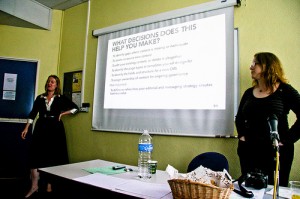
Fascinating as Content Strategy Forum 2010 was two weeks ago, one major thing that came out of it was the need for benchmarked case studies that focus specifically on online content strategy, its effects and its impacts on the development and success of a website.
Serendipity landed Kristina Halvorson (queen of content strategy) next to me at lunchtime on #csforum10 Friday – which, by the way, was a three-course à la carte lunch with wine. (Bless whoever decided to set the first-ever dedicated content strategy event in Paris in the springtime.)
Content is a hard sell
Halvorson admitted that content strategy can be a hard sell, particularly in an environment that is prioritised for design and development with content requirement boxes full of 'lorum ipsem' often only fulfilled with real content at the 11th hour.
There is a lot of advocacy for content strategy going on at the moment to sort out the mess of working this way.
Halvorson herself has spent the last 18 months being very vocal about why something as crucial as content should be considered not only upfront but throughout its lifecycle. She looks for content advocates within organisations to help make the case. And last year, she wrote Content Strategy for the Web, a handbook that outlines a repeatable process to take care of the whole messy content thing.
Finally, the content strategy buzz of 2009 means that clients are starting to request content strategy directly.
Lack of successful case studies
And yet, despite reading the book and saying 'yes Yes YES' like Meg Ryan in When Harry Met Sally at the common sense that lies within, the finally page is a massive deflation:
'At the time of writing, I'm not aware of a single case study available to the public that documents a content strategy successs story.'
It was something she echoed at lunch. Part of this is because projects are often not benchmarked from the outset and then monitored for change arising from content strategy changes. Partly, it's because content advocates are still trying to get in on the act at an early enough stage.
But expect to see some case studies soon, I think.
Facebook's content strategy success
It was great, for example, to hear Sarah Cancilla, the solo content strategist at Facebook, talk about some basic content tweaking to make the calls to action clearer on the 'Get connected' section. Some simple sub-editing here resulted in an overnight rise of 56% net traffic to those three links and six million more people connecting as a result of the change.
Six million! Now that's what I call a justification.
Facebook is now also hiring a second content strategist, unsurprisingly.
A multi-tasking discipline
But as a former sub-editor, I'm not surprised. I come from a background of 20 years' prepping raw copy for an audience, both in print and online, and trying to make it more engaging, clear and understandable for readers.
But content strategy is not just sub-editing and clever writing. And there is still a whole lot of new to take on board…
A content strategist has to get to grips with the disciplines of information architecture, user experience, monitoring and analytics, pinning down key business goals, auditing and analysis, alignment of stakeholders, and so on. All of these inform the choice of content.
It's a lot to get your arms around, as Halvorson might say.
But forget arms. Since coming back from Paris, I've put my legs on backwards and kicked myself up the butt to initiate three content strategy projects for clients. I'm hoping to create a benchmarkable case with one of them in particular.
Fierce Festival as a case study
Fierce Festival, an internationally renowned arts festival based in the West Midlands since 1997, has become a different beast over the years. It has developed a training arm for artists and consultancy arm for arts organisations. The festival itself is also morphing and this year has two new artistic directors, Harun and Laura.
With their arrival comes a clean slate. Past sites have been archived or taken offline and a blog has been set up as a conversation leading towards a future full-scale festival website, in which all the strands of Fierce will be brought together under one umbrella at last.
I've volunteered to help with this from a content perspective. It's going to be a journey but I'll be documenting some of the issues involved in trying to unify Fierce's radical and innovative performance side with its practical training/consultancy side.
Halp!
Of course, I'm learning here too so I'm kind of on my own journey here with content strategy – and the arts, too, since the rest of the week I'm Grant Thornton's freelance blogger (they're a large accountancy firm btw).
I hope the project will be interesting to watch, document or engage with. I should be blogging about it both here and possibly on Fierce's blog as their journey develops.
Not having been in Birmingham at the same time as Fierce festival, I'm also fresh to it, but would love to hear from fans of Fierce if you want to give me a nudge about something.
(Afterthought: how much will people be looking for Fierce festival stuff on smartphones, do you think? Great slideshare from #csforum10 on optimising content for mobile by Erin Scime. Would hate to see web/blog stuff shovelled onto the small screen.)